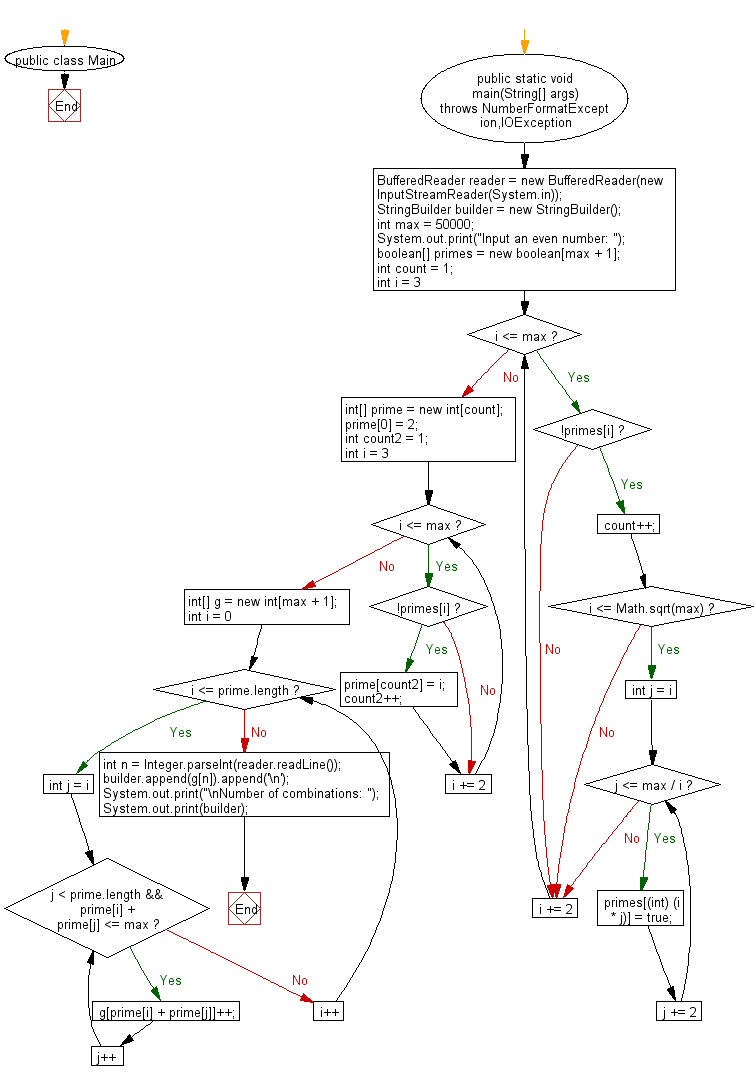Java Exercises: Accept a even number from the user and create a combinations that express the given number as a sum of two prime numbers
Java Basic: Exercise-233 with Solution
Write a Java program that accept a even number (n should be greater than or equal to 4 and less than or equal to 50,000, Goldbach number) from the user and create a combinations that express the given number as a sum of two prime numbers. Print the number of combinations.
Goldbach number: A Goldbach number is a positive even integer that can be expressed as the sum of two odd primes.[4] Since four is the only even number greater than two that requires the even prime 2 in order to be written as the sum of two primes, another form of the statement of Goldbach's conjecture is that all even integers greater than 4 are Goldbach numbers.
The expression of a given even number as a sum of two primes is called a Goldbach partition of that number. The following are examples of Goldbach partitions for some even numbers:
6 = 3 + 3
8 = 3 + 5
10 = 3 + 7 = 5 + 5
12 = 7 + 5
...
100 = 3 + 97 = 11 + 89 = 17 + 83 = 29 + 71 = 41 + 59 = 47 + 53
Sample Solution:
Java Code:
import java.io.BufferedReader;
import java.io.IOException;
import java.io.InputStreamReader;
public class Main {
public static void main(String[] args) throws NumberFormatException,IOException {
BufferedReader reader = new BufferedReader(new InputStreamReader(System.in));
StringBuilder builder = new StringBuilder();
int max = 50000;
System.out.print("Input an even number: ");
boolean[] primes = new boolean[max + 1];
int count = 1;
for (int i = 3; i <= max; i += 2) {
if (!primes[i]) {
count++;
if (i <= Math.sqrt(max)) {
for (int j = i; j <= max / i; j += 2) {
primes[(int) (i * j)] = true;
}
}
}
}
int[] prime = new int[count];
prime[0] = 2;
int count2 = 1;
for (int i = 3; i <= max; i += 2) {
if (!primes[i]) {
prime[count2] = i;
count2++;
}
}
int[] g = new int[max + 1];
for (int i = 0; i <= prime.length; i++) {
for (int j = i; j < prime.length && prime[i] + prime[j] <= max; j++) {
g[prime[i] + prime[j]]++;
}
}
int n = Integer.parseInt(reader.readLine());
builder.append(g[n]).append('\n');
System.out.print("\nNumber of combinations: ");
System.out.print(builder);
}
}
Sample Output:
Input an even number: 100 Number of combinations: 6
Pictorial Presentation:
Flowchart:

Java Code Editor:
Contribute your code and comments through Disqus.
Previous: Write a Java program to compute the sum of first n given prime numbers.
Next: Write a Java program to create maximum number of regions obtained by drawing n given straight lines.
What is the difficulty level of this exercise?
Test your Programming skills with w3resource's quiz.
Java: Tips of the Day
How to sort an ArrayList?
Collections.sort(testList); Collections.reverse(testList);
That will do what you want. Remember to import Collections though!
Ref: https://bit.ly/32urdSe
- New Content published on w3resource:
- HTML-CSS Practical: Exercises, Practice, Solution
- Java Regular Expression: Exercises, Practice, Solution
- Scala Programming Exercises, Practice, Solution
- Python Itertools exercises
- Python Numpy exercises
- Python GeoPy Package exercises
- Python Pandas exercises
- Python nltk exercises
- Python BeautifulSoup exercises
- Form Template
- Composer - PHP Package Manager
- PHPUnit - PHP Testing
- Laravel - PHP Framework
- Angular - JavaScript Framework
- Vue - JavaScript Framework
- Jest - JavaScript Testing Framework
